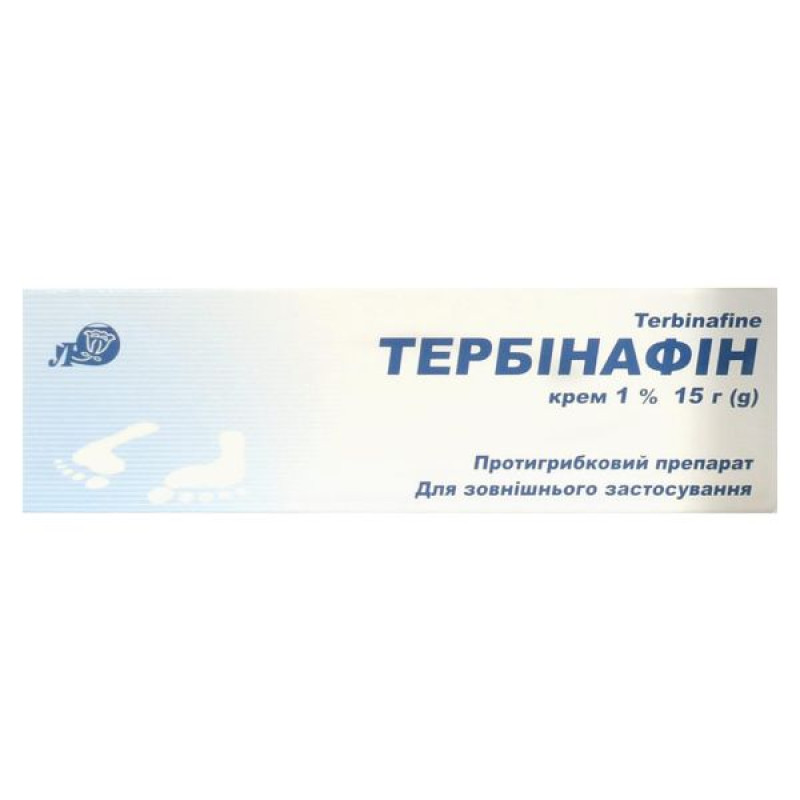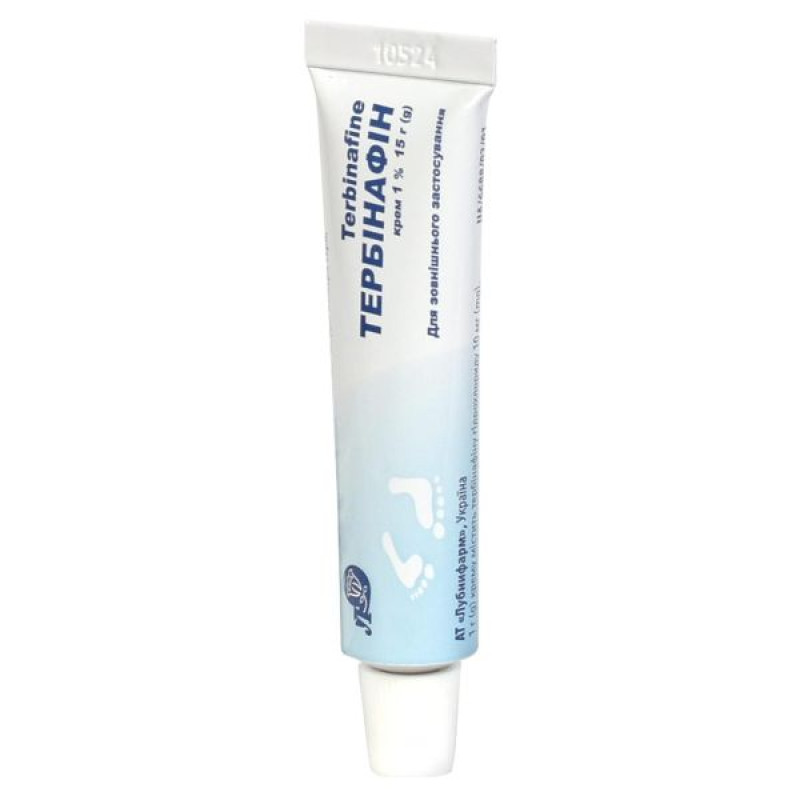Terbinafine cream 1% tube 15 g

Instructions Terbinafine cream 1% tube 15 g
Composition
active ingredient: terbinafine hydrochloride;
1 g of cream contains 10 mg of terbinafine hydrochloride, which corresponds to 8.8 mg of terbinafine;
excipients: benzyl alcohol, sodium hydroxide, sorbitan stearate, cetyl palmitate, stearyl alcohol, cetyl alcohol, polysorbate 60, isopropyl myristate, purified water.
Dosage form
Cream.
Main physicochemical properties: white or almost white homogeneous cream with a faint specific odor.
Pharmacotherapeutic group
Antifungal drugs for topical use.
ATX code D01A E15.
Pharmacological properties
Pharmacodynamics.
Terbinafine is an allylamine and has a broad spectrum of antifungal activity. Terbinafine at low concentrations has fungicidal activity against dermatophytes, molds and some dimorphic fungi. Activity against yeasts, depending on their species, can be fungicidal or fungistatic.
Terbinafine specifically inhibits the early stage of sterol biosynthesis in the fungal cell membrane. This leads to ergosterol deficiency and intracellular accumulation of squalene, which causes fungal cell death. Terbinafine acts by inhibiting the enzyme squalene epoxidase in the fungal cell membrane. This enzyme does not belong to the cytochrome P450 system. Terbinafine does not affect the metabolism of hormonal agents or other drugs.
Pharmacokinetics.
When applied topically, less than 5% of the dose is absorbed, so the absorption of terbinafine into the systemic bloodstream is insignificant.
After 7 days of treatment with Terbinafine Cream, concentrations of terbinafine exceeding those required for fungicidal activity are present in the stratum corneum of the epidermis for at least 7 days after cessation of treatment.
Indication
Fungal skin infections caused by dermatophytes such as Trichophyton (e.g. T. rubrum, T. mentagrophytes, T. verrucosum, T. violaceum), Microsporum canis and Epidermophyton floccosum, e.g. tinea pedis; inguinal ringworm (jock itch); truncal ringworm (ringworm); cutaneous candidiasis caused by fungi of the genus Candida, usually Candida albicans; tinea versicolor (pityriasis versicolor) caused by Pityrosporum orbiculare (also known as Malassezia furfur).
Contraindication
Hypersensitivity to terbinafine or to any of the components of the drug.
Interaction with other medicinal products and other types of interactions
Unknown.
Application features
The cream is for external use only. Avoid contact with the eyes, as the medicine may cause eye irritation. If the cream accidentally gets into the eyes, rinse them thoroughly with running water. The medicine contains cetyl alcohol and stearyl alcohol, which may cause local skin irritation (e.g. contact dermatitis).
Infants should avoid contact with the skin to which the medicine has been applied, including the mammary glands.
In animal studies, no effect of terbinafine on fertility was observed.
Use during pregnancy or breastfeeding
In animal studies, no embryotoxic effects of terbinafine were observed. Since clinical experience of the drug in women during pregnancy is limited, the drug should not be used in pregnant women, except in cases where, in the opinion of the physician, the expected positive effect for the woman outweighs the potential risk to the fetus.
Terbinafine passes into breast milk, so the drug should not be used by women during breastfeeding. Infants should be avoided from contact with the skin on which the drug has been applied, including the mammary glands.
Ability to influence reaction speed when driving vehicles or other mechanisms
Topical application of terbinafine does not affect the ability to drive or use other machinery.
Method of administration and doses
The cream is intended for external use only.
Adults and children aged 12 and over
Terbinafine should be applied to the skin 1 or 2 times a day, depending on the disease. Before applying the cream, the affected areas must be thoroughly cleaned and dried. The cream should be applied in a thin layer to the affected skin and adjacent areas, rubbing in lightly. In infections accompanied by diaper rash (under the mammary glands, in the interdigital area, in the groin area and between the buttocks), the application sites can be covered with gauze, especially at night.
Duration and frequency of treatment
The duration of treatment depends on the severity of the disease:
– interdigital tinea versicolor, inguinal tinea versicolor and tinea versicolor of the trunk: once a day for 1 week;
– squamous-hyperkeratotic dermatophytosis of the feet (“moccasin foot”): 2 times a day for 2 weeks;
– skin candidiasis: 1–2 times a day for 1–2 weeks;
– lichen planus: 1–2 times a day for 2 weeks.
No dose adjustment is necessary for elderly patients.
Relief of symptoms usually occurs within a few days. Irregular use or premature discontinuation of treatment may lead to relapse.
If there are no signs of improvement after two weeks of treatment, you should consult a doctor.
Experience with the drug in children under 12 years of age is limited, so the drug should not be used in this age group of patients.
Overdose
The low systemic absorption of terbinafine when applied topically makes overdose extremely unlikely. Accidental ingestion of the contents of one 15 g tube (containing 150 mg terbinafine hydrochloride) is comparable to ingestion of half a 250 mg Terbinafine tablet (oral formulation). In case of overdose caused by accidental ingestion of a large amount of cream, side effects should be similar to those seen with an overdose of Terbinafine tablets (headache, nausea, epigastric pain and dizziness).
Treatment of overdose by accidental ingestion consists of removing the active substance, primarily by taking activated charcoal, and providing symptomatic therapy if necessary.
Adverse reactions
Local manifestations such as itching, peeling or burning of the skin, pain and irritation at the application site, pigmentation disorders, erythema, crusting and other manifestations may be observed at the application site. These minor manifestations should be distinguished from hypersensitivity reactions, including rash, which have been reported in isolated cases and require discontinuation of treatment. In case of accidental contact with the eyes, terbinafine hydrochloride may cause irritation. In rare cases, latent fungal infections may be exacerbated.
Possible side effects:
On the part of the immune system
Frequency not known (cannot be estimated from the available data): hypersensitivity reactions, including urticaria. In isolated cases, angioedema and anaphylactic shock.
From the organs of vision
Uncommon (≥1/10,000,
Skin and connective tissue disorders
Common (≥ 1/100,
Uncommon (≥ 1/1000, 1/100): skin damage, crusting, skin lesion, pigmentation disorder, erythema, burning sensation of the skin.
Uncommon (≥1/10,000,
Frequency not known (cannot be estimated from the available data): rash or blistering.
General disorders and administration site conditions
Uncommon (≥ 1/1000, 1/100): pain, application site pain, application site irritation.
Uncommon (≥1/10,000,
Reporting of suspected adverse reactions
Reporting adverse reactions after the registration of a medicinal product is important. This allows monitoring of the benefit/risk ratio when using this medicinal product. Medical and pharmaceutical professionals, as well as patients or their legal representatives, should report all cases of suspected adverse reactions and lack of efficacy of the medicinal product via the Automated Information System for Pharmacovigilance at the link: https://aisf.dec.gov.ua.
Expiration date
3 years.
Storage conditions
Store in the original packaging at a temperature not exceeding 25 °C.
Keep out of reach of children.
Packaging
15 g in a tube, 1 tube in a cardboard pack.
Vacation category
Without a prescription.
Producer
JSC "Lubnypharm".
Location of the manufacturer and address of its place of business
Ukraine, 37500, Poltava region, Lubny, Barvinkova st., 16.
There are no reviews for this product.
There are no reviews for this product, be the first to leave your review.
No questions about this product, be the first and ask your question.







